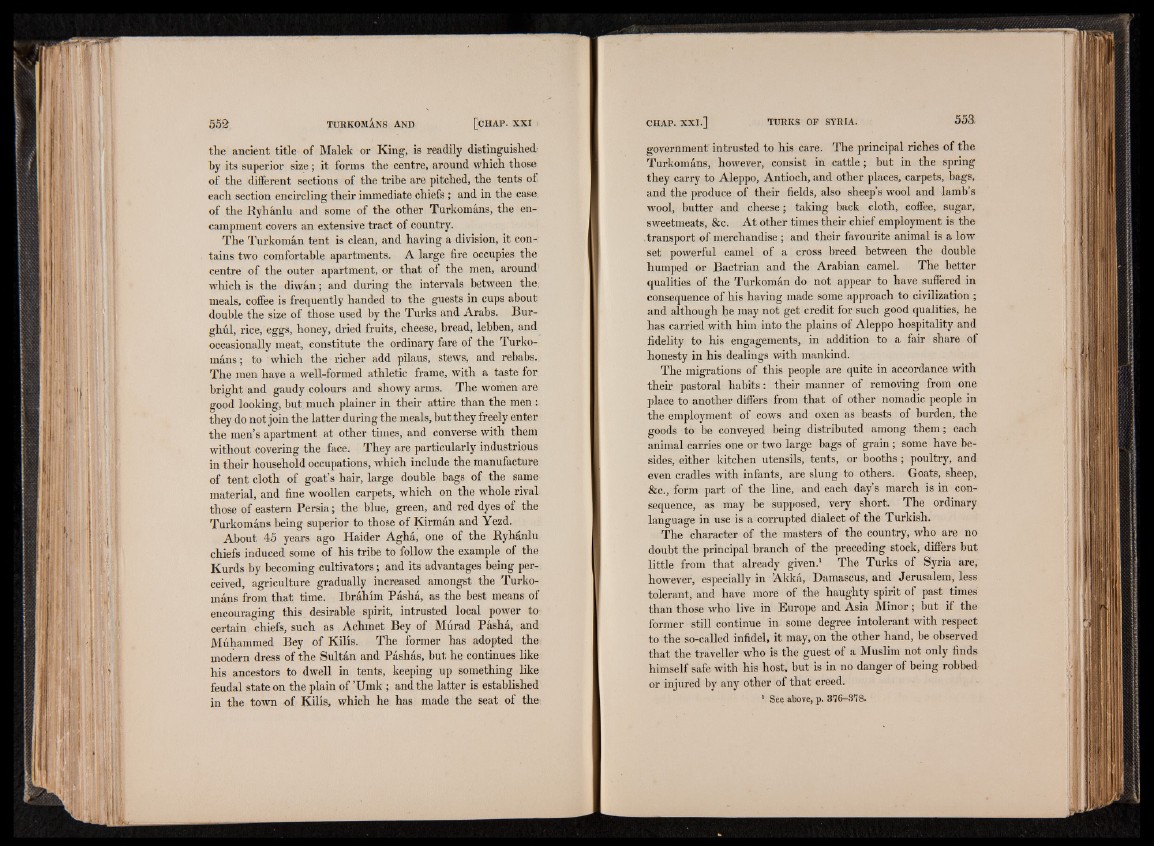
the ancient title of Malek or King, is readily distinguished
by its superior size; it forms the centre, around which those
of the different sections of the tribe are pitched, the tents of.
each section encircling their immediate chiefs; and in the case;
of the Ryhanlu and some of the other Turkomans, the encampment
covers an extensive tract of country.
The Turkoman tent is clean, and having a division, it contains
two comfortable apartments. A large fire occupies the
centre of the outer apartment, or that of the men, around’
which is the diwan; and during the intervals between the;
meals, coffee is frequently handed to the guests in cups about
double the size of those used by the Turks and Arabs. Bur-
ghul, rice, eggs, honey, dried fruits, cheese, bread, lebben, and
occasionally meat, constitute the ordinary fare of the Turkomans;
to which the richer add pilaus, stews, and rebabs..
The men have a well-formed athletic frame, with a taste for
bright and gaudy colours and showy arms. The women are
good looking, but much plainer in their attire than the men:
they do not join the latter during the meals, but they freely enter
the men’s apartment at other times, and converse with them
without covering the face. They are particularly industrious
in their household occupations, which include the manufacture
of tent cloth of goat’s hair, large double bags of the same
material, and fine woollen carpets, which on the whole rival
those of eastern Persia; the blue, green, and red dyes of the
Turkomans being superior to those of Kirman and Yezd.
About 45 years ago Haider Agha, one of the Ryhanlu
chiefs induced some of his tribe to follow the example of the
Kurds by becoming cultivators; And its advantages being perceived,
agriculture gradually increased amongst the Turkomans
from that time. Ibrahim Pasha, as the best means of
encouraging this, desirable spirit, intrusted local power to
certain chiefs, such as Achinet Bey of Murad Pasha, and
Muhammed Bey of Kills. The former has adopted the
modern dress of the Sultan and Pashas, but he continues like
his ancestors to dwell in tents, keeping up something like
feudal state on the plain of ’Umk ; and the latter is established
in the town of Kills, which he has made the seat of the;
government intrusted to his care. The principal riches of the
Turkomans, however, consist in cattle; but in the spring
they carry to Aleppo, Antioch, and other places, carpets, bags,
and the produce of their fields, also sheep’s wool and lamb’s
wool, butter and cheese; taking back cloth, coffee, sugar,
sweetmeats, &c. At other times their chief employment is the
transport of merchandise ; and their favourite animal is a low
set powerful camel of a cross breed between the double
humped or Bactrian and the Arabian camel. The better
qualities of the Turkoman do not appear to have suffered in
consequence of his having made some approach to civilization ;
and although he may not get credit for such good qualities, he
has carried with him into the plains of Aleppo hospitality and
fidelity to his engagements, in addition to a fair share of
honesty in his dealings with mankind.
The migrations of this people are quite in accordance with
their pastoral habits: their manner of removing from one
place to another differs from that of other nomadic people in
the employment of cows and oxen as beasts of burden, the
goods to be conveyed being distributed among them; each
animal carries one or two large bags of grain; some have besides,
either kitchen utensils, tents, or booths ; poultry, and
even cradles with infants, are slung to others. Goats, sheep,
&c., form part of the line, and each day’s march is in consequence,
as may be supposed, very short. The ordinary
language in use is a corrupted dialect of the Turkish.
The character of the masters of the country, who are no
doubt the principal branch of the preceding stock, differs but
little from that already given.1 The Turks of Syria are,
however, especially in Akka, Damascus, and Jerusalem, less
tolerant, and have more of the haughty spirit of past times
than those who live in Europe and Asia Minor; but if the
former still continue in some degree intolerant with respect
to the so-called infidel, it may, on the other hand, be observed
that the traveller who is the guest of a Muslim not only finds
himself safe with his host, but is in no danger of being robbed
or injured by any other of that creed.
* See above, p. 316-318.